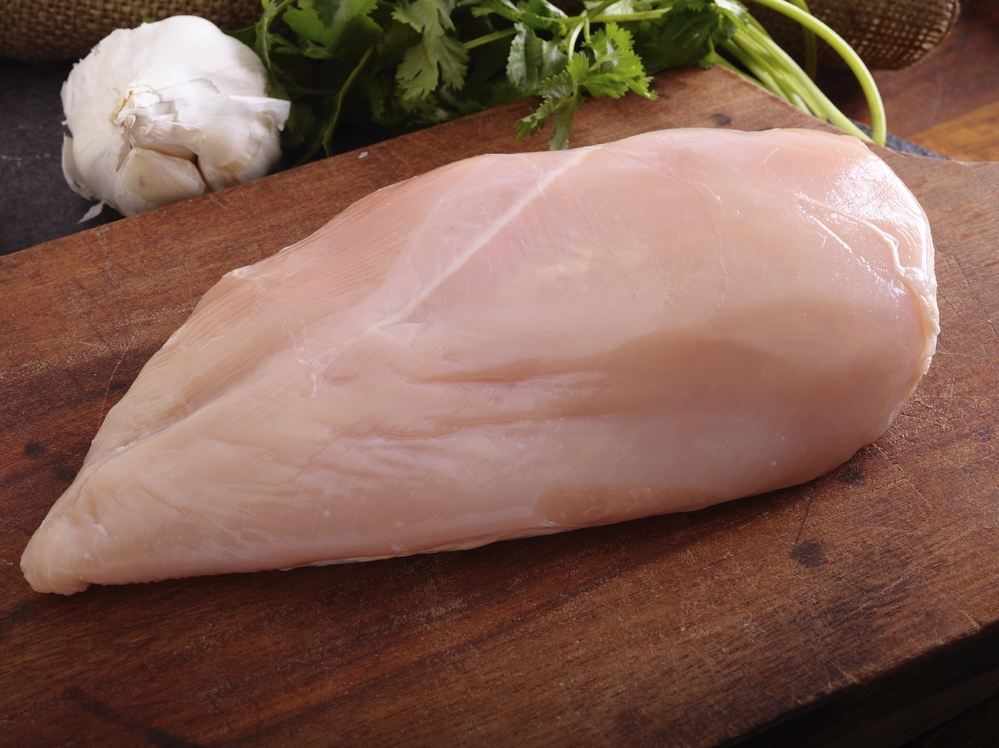 Enlarge image i
Enlarge image i Roxarsone, a drug linked to elevated levels of inorganic arsenic in chicken meat, is no longer used in broiler chicken farming, producers say. But another arsenic-based drug is still used to raise turkeys.

Roxarsone, a drug linked to elevated levels of inorganic arsenic in chicken meat, is no longer used in broiler chicken farming, producers say. But another arsenic-based drug is still used to raise turkeys.
A study published online recently in the journal Environmental Health Perspectives documented slightly elevated levels of arsenic in samples of chicken purchased at grocery stores in 10 cities in the U.S.
So how did trace amounts of this toxin end up in supermarket poultry?
Well, arsenic-based drugs are approved for use in chicken and turkey production. At the time of the grocery-store testing, back in late 2010 and early 2011, a drug called Roxarsone was still being used in chicken feed to stave off infections with parasites. (The drug was voluntarily pulled from the market in June 2011 by its manufacturer.)
"We did the study to learn whether using arsenic-based drugs leads to increases in the toxic form of arsenic in meat," explains researcher Keeve Nachman of Johns Hopkins. And it turns out, it does. A little.
The researchers documented 2.3 ppb that's parts per billion of inorganic arsenic (the more toxic type of arsenic) in the meat of chicken that had measurable levels of Roxarsone.
By comparison, the meat from chicken that had no detectable levels of Roxarsone had 0.8 ppb of inorganic arsenic. That's three times less.
But it's important to point out that these low levels are far below the 500 ppb tolerance levels set by the FDA.
The researchers found no measurable trace of the arsenic-based drug in the 25 organic samples they tested (Roxarsone is not allow in organic chicken). By comparison, 20 of the 40 samples of meat from chickens raised conventionally did contain the drug.
The National Chicken Council released a statement calling the study's conclusions misleading. Broiler chicken producers, the council says, are no longer using any arsenic-based drugs.
In lieu of Roxarsone, which had been used to prevent intestinal parasites, chicken producers have switched to drugs known as ionophores.
"Today, folks [chicken producers] are just doing the best they can without" Roxarsone, says Tom Super of the National Chicken Council. He says the ionophores are not as effective against the parasites.
The FDA, in this Q & A, says another arsenic-based drug known as Nitarsone is still being marketed. It's approved for use in chickens and turkeys. Though the FDA does not disclose animal drug sales data, the drug is used to prevent outbreaks of blackhead, an infection caused by parasites, in turkeys.
The National Turkey Federation says Nitarsone is used primarily in the turkeys' first few weeks of life and used more heavily during the summer months, when blackhead is more likely to occur. The industry depends on the drug as a preventive, since there's no effective treatment once an outbreak occurs.
The authors of the new study say they hope the FDA considers their conclusions in making decisions about the approvals for these drugs.
"Roxarsone still continues to be sold by [drug company] Zoetis in Latin America" and is still approved for use here, Johns Hopkins' Nachman says, despite the fact that it was voluntarily pulled from the market in 2011.
The FDA says it continues to investigate all uses of arsenic-based drugs in food-producing animals, and agency spokesperson Jalil Isa says the agency "will take the appropriate action to protect public health."
2013 meat adulteration scandal - Wikipedia, the free encyclopedia The 2013 meat adulteration scandal is ongoing in Europe; foods advertised as containing beef were found to contain undeclared horse meat, as much as 100% of the meat ... Paleo Diet Food Mall/Products/Snacks/Stores/Vendors Paleo foods include: meat, fish, eggs, fruit, vegetables, nuts, and berries. Preferrably organic. Excluded are: grains, dairy, beans/legumes, potatoes, sugar ... Organic food - Wikipedia, the free encyclopedia Organic foods are foods that are produced using methods of organic farming -- that do not involve modern synthetic inputs such as synthetic pesticides and chemical ... trace element: Definition from Answers.com n. A chemical element required in minute quantities by an organism to maintain proper physical functioning. A minute quantity or amount: "The trace elements of belief ... Wisconsin Institute of Nutrition, LLP Wisconsin Institute of Nutrition, LLP. This website is produced by Wisconsin Institute of Nutrition, LLP. It is designed to give you information about how you can ... Tests Show Most Store Honey Isn't Honey Food Safety News Tests Show Most Store Honey Isnt Honey Ultra-filtering Removes Pollen, Hides Honey Origins By Andrew Schneider November 7, 2011 The 13 nasties banned in other countries but allowed in US foods ... What do a yoga mat, sneaker soles and a loaf of Wonder Bread have in common? All contain azodicarbonamide, a chemical primarily used in foam plastics but also used to ... Business News, Personal Finance and Money News - ABC News Find the latest business news on Wall Street, jobs and the economy, the housing market, personal finance and money investments and much more on ABC News How Meat Contributes to Global Warming: Scientific American Producing beef for the table has a surprising environmental cost: it releases prodigious amounts of heat-trapping greenhouse gases Vanishing Point: How to disappear in America without a trace "In the midst of the words he was trying to say In the midst of his laughter and glee He silently and quietly vanished away For the snark was a boson, you see ...
No comments:
Post a Comment